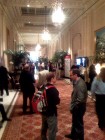
|
||||||||||||||||||||||||||||||||||||||||||||||||||||||
|
I added his expand/collapse code to the HTML rendering of Scripting News, per my recent request. It seems to work nicely. Does it work in Opera? Please let me know. LobbyCon 2.0 predicts the Newsroom of the Future
It was unlike anything I had seen before, likely because this conference was held in downtown SF, and not San Diego or Phoenix, and a facet of what we'll have when the Newsroom of the Future is up and running. Every city will have one, but San Francisco will probably be first. Here's a video I took last week at CUNY that gives another perspective. Lots of tables, video screens, a stage, radio and TV equipment. What you can't see is that the room was saturated with wifi, and while it didn't have a huge presence on the Internet, it could have. Today's new (developer's) toy is an OPML 2.0 rendering of the NY Times keywords list. Have fun! Doc: "A year from now every newspaper will have a newsriver." I think so too because: 1. The idea is so compelling and 2. It's so easy to implement. Thanks so much to Doc Searls for writing a great evangelical piece about the power of rivers. The stream is turning into a current, and soon really will be a river. It’s so weird to see rivers show up in Facebook, and Twitter is just a big river of all the people you’re following.
The more attention we get focused on it, the more other developers will tune in.
I really hope some of this stuff feeds back into the Times support of RSS. And as you have seen, there are now lots of new opportunities in user interface for news. This is what I do, when I'm in my "flow" -- we're there now again, with a new toy to build and then play with, every day. Betsy Devine: "Dave Winer has been improving the New York Times for as long as I’ve known him." Phil Windley: "With more sources, who are themselves continuously updating, the keyword river could be as dynamic as you’d want it to be."
Before last night's game they were down 3-1 in the ALCS, but they won, and now they're down 3-2. These are long odds, but with the Red Sox, you never know. (They were down 3-0 in 2004 and came back, amazingly, to beat the Yankees, a sweet wonderful humiliating defeat.) For some reason, last night I thought of Aaron Copland's Appalachian Spring as an appropriate anthem for this moment in Red Sox time. The pioneers have their ups and downs, theres's still hope, but they've suffered greatly. I think of Dowbrigade, hunkered down, feeling sure his team will exceed his worst expectation of disaster. With the Red Sox, as with Jerry Garcia and Scripting News, it's even worse than it appears! |
Dave Winer, 52, pioneered the development of weblogs, syndication (RSS), podcasting, outlining, and web content management software; former contributing editor at Wired Magazine, research fellow at Harvard Law School, entrepreneur, and investor in web media companies. A native New Yorker, he received a Master's in Computer Science from the University of Wisconsin, a Bachelor's in Mathematics from Tulane University and currently lives in Berkeley, California. "The protoblogger." - NY Times.
"The father of modern-day content distribution." - PC World.
One of BusinessWeek's 25 Most Influential People on the Web. "Helped popularize blogging, podcasting and RSS." - Time.
"The father of blogging and RSS." - BBC.
"RSS was born in 1997 out of the confluence of Dave Winer's 'Really Simple Syndication' technology, used to push out blog updates, and Netscape's 'Rich Site Summary', which allowed users to create custom Netscape home pages with regularly updated data flows." - Tim O'Reilly.
My most recent trivia on Twitter. Comment on today's On This Day In: 2006 2005 2004 2003 2002 2001 2000 1999 1998 1997.
|
|||||||||||||||||||||||||||||||||||||||||||||||||||||
|
© Copyright 1997-2007 Dave Winer. Previous / Next |
||||||||||||||||||||||||||||||||||||||||||||||||||||||





 If I were an American League fan there's little doubt that I would be a Red Sox fan. They have it all. Fenway Park. The Green Monster. The Curse of the Bambino. And an ancient legacy of sucking and when it looks like they're not sucking so bad, blowing it in the worst way possible at the last possible moment. The drama of the Red Sox, the agony of their fans. The only more hapless team in baseball is my beloved New York Mets. (And possibly the Chicago Cubs.)
If I were an American League fan there's little doubt that I would be a Red Sox fan. They have it all. Fenway Park. The Green Monster. The Curse of the Bambino. And an ancient legacy of sucking and when it looks like they're not sucking so bad, blowing it in the worst way possible at the last possible moment. The drama of the Red Sox, the agony of their fans. The only more hapless team in baseball is my beloved New York Mets. (And possibly the Chicago Cubs.)

